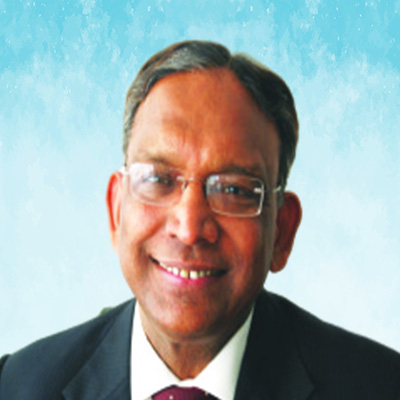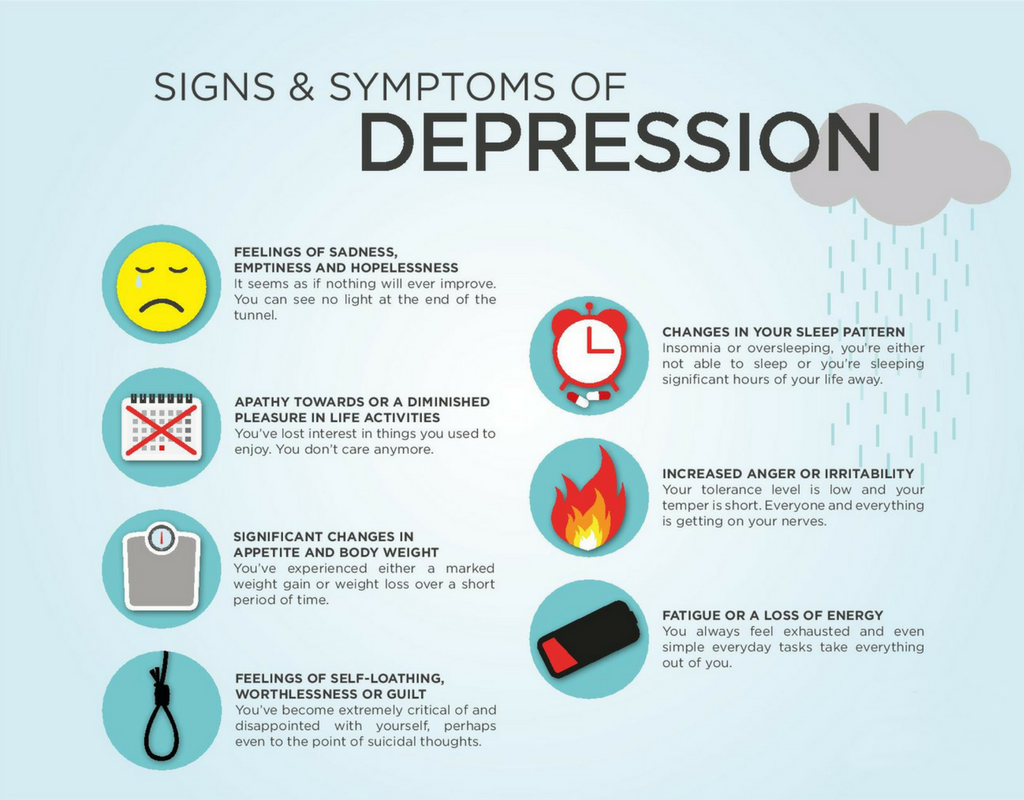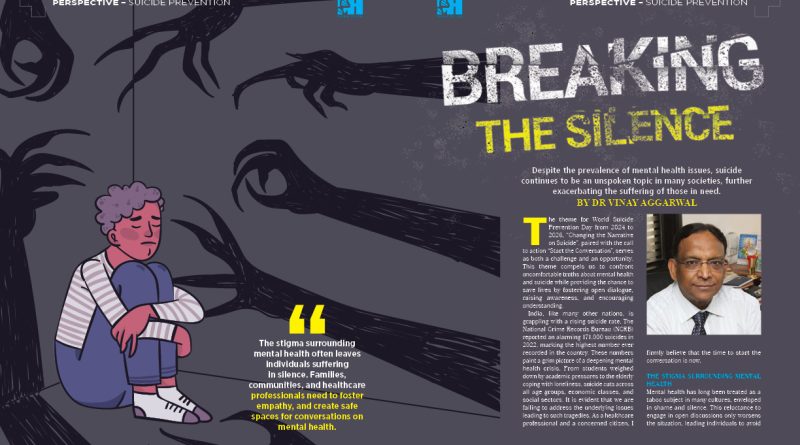BREAKING THE SILENCE
 Despite the prevalence of mental health issues, suicide continues to be an unspoken topic in many societies, further exacerbating the suffering of those in need.
Despite the prevalence of mental health issues, suicide continues to be an unspoken topic in many societies, further exacerbating the suffering of those in need.
By Dr Vinay Aggarwal
The theme for World Suicide Prevention Day from 2024 to 2026, “Changing the Narrative on Suicide”, paired with the call to action “Start the Conversation”, serves as both a challenge and an opportunity. This theme compels us to confront uncomfortable truths about mental health and suicide while providing the chance to save lives by fostering open dialogue, raising awareness, and encouraging understanding.
India, like many other nations, is grappling with a rising suicide rate. The National Crime Records Bureau (NCRB) reported an alarming 171,000 suicides in 2022, marking the highest number ever recorded in the country. These numbers paint a grim picture of a deepening mental health crisis. From students weighed down by academic pressures to the elderly coping with loneliness, suicide cuts across all age groups, economic classes, and social sectors. It is evident that we are failing to address the underlying issues leading to such tragedies. As a healthcare professional and a concerned citizen, I firmly believe that the time to start the conversation is now.
The Stigma Surrounding Mental Health
Mental health has long been treated as a taboo subject in many cultures, enveloped in shame and silence. This reluctance to engage in open discussions only worsens the situation, leading individuals to avoid seeking help and isolating those who need support the most. The misunderstanding and stigma attached to mental health struggles leave many suffering in solitude. The theme of “Changing the Narrative” calls for a collective shift from judgment and fear to empathy, understanding, and acceptance. It encourages us to recognise mental health issues as legitimate and critical concerns that require care and attention just like physical health.
Open communication is a crucial aspect of suicide prevention. People suffering from depression, anxiety, or suicidal thoughts often feel they have no one to turn to, fearing they will be judged or perceived as burdensome. By fostering an environment of understanding, we can create safe spaces where individuals feel comfortable expressing their emotions. Schools, workplaces, homes, and community spaces have an essential role in promoting mental health awareness and providing resources to those in need. The more we normalise conversations about mental health, the more accessible help becomes for those who are struggling.

Strategies for Curbing Suicidal Thoughts
The 2024 call to action, “Start the Conversation,” is both simple and profound. It urges us to break the silence surrounding suicide by encouraging discussions in our homes, communities, workplaces, and schools. It is not just up to professionals and loved ones; we all have a part to play in recognising the signs of someone in distress and offering a compassionate ear.
1.Families and Friends as First Responders
Families are often the first to notice signs of distress in a loved one. Changes in behaviour, withdrawal from social activities, or expressions of hopelessness can all indicate deeper struggles. A simple, non-judgmental conversation may be the lifeline someone needs. Families should be equipped with the knowledge and resources to identify these early warning signs and encourage their loved ones to seek professional help.
2.Timely Intervention: The Key to Prevention
Timely intervention can mean the difference between life and death in suicide prevention. Addressing mental health concerns early allows for a wider range of treatment options and reduces the risk of an individual resorting to suicide as an escape from pain and distress. It’s not just about immediate action—it’s about creating a culture where asking for help is seen as a strength, and mental health issues are openly discussed without fear of stigma.
3.Healthcare Professionals: The First Line of Defence
Healthcare professionals are uniquely positioned to lead the charge in changing the narrative on suicide. Integrating mental health care into routine medical check-ups can proactively address concerns before they escalate into crises. General practitioners, in particular, should be trained to identify early signs of depression or suicidal ideation and provide timely referrals to mental health specialists.
4.Empathy as a Tool to Prevent Impulsive Actions
Many suicides are the result of impulsive decisions made in moments of intense emotional distress. Empathy can play a crucial role in defusing these impulses by helping individuals feel understood and supported. Offering non-judgmental support during times of crisis can help individuals pause, reflect, and seek healthier ways to cope with their emotions.
5.The Role of Media and Community
The media and community at large have a critical role to play in shaping societal attitudes towards suicide and mental health. Responsible media coverage that avoids sensationalism and focuses on stories of hope and recovery can help reduce the stigma surrounding mental health issues. Additionally, community-based programmes, awareness campaigns, and support networks can provide individuals with the resources and safe spaces they need to seek help.

Takeaways
Hospitals and clinics must offer more than just immediate care—they should provide ongoing resources for mental health support, including counselling services for patients and their families. Equally important, our medical infrastructure needs to be strengthened to address mental health needs on a larger scale, particularly in rural and underserved areas where access to care is still limited.
Talking about mental health and suicide can prevent unnecessary loss of life. We must create supportive environments that are free from stigma, where individuals feel safe to share their struggles and seek help. Let us all take the call to action seriously. Whether you’re a family member, friend, colleague, or healthcare provider, your willingness to listen, ask how someone is doing, and offer support could save a life. It’s time to break the silence and change the narrative around suicide for the better.
(The author is Past National President of the Indian Medical Association & Head of Pushpanjali Medical Centre, New Delhi)

